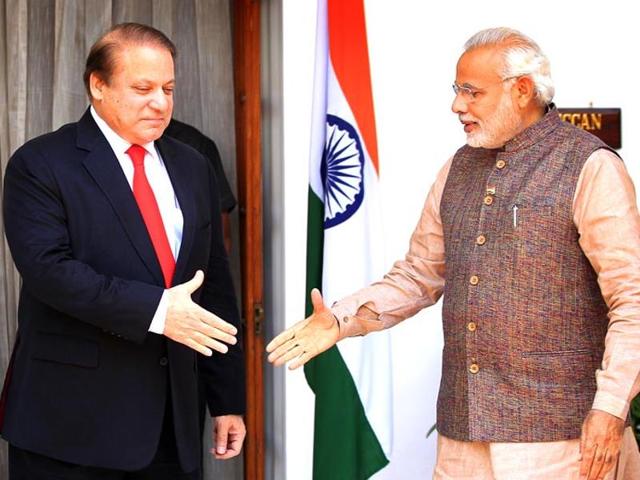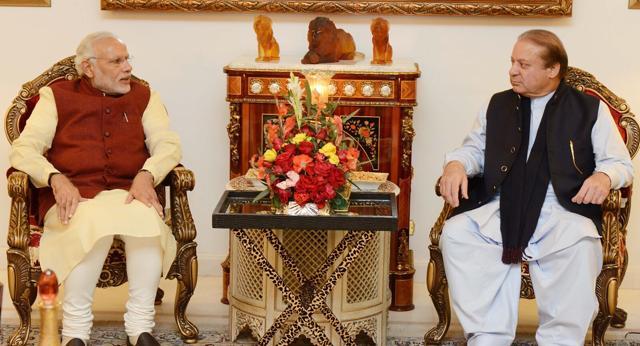After Pathankot, Nawaz must ensure talks with India don’t fail
India cannot be expected to put up with attacks like that on Pathankot IAF airbase, which Nawaz Sharif must exert his authority to stop. The ball lies squarely in Nawaz Sharif’s court to ensure that the ensued peace talks with India don’t fail.
Pathankot was as inevitable as night following day. The only element of surprise, if any, was that night followed the dawn without the usual interregnum of the day – it came immediately after the Prime Minister’s dramatic overture of going to Lahore.

A pattern has existed for some time that whenever there is an effort to move to a normal state of relations, this sort of outrage would follow. I presume the attack in Pathankot was anticipated by the powers that be in Delhi, they must have feared that something of this sort would happen.
The question now is how to move forward. The Prime Minister and his government are hoist with their own petard because they had, while in opposition, objected to any effort by the UPA at rapprochement, arguing that one can’t have talks and terror at the same time.
Now that it is in government, the BJP realises the constraints both of governance and power. It has come to the realisation that you have to make a serious and sustained effort to engage Pakistan.
The problem is the narrative it created and that has prevailed so far, which causes a certain amount of confusion in the public mind.
Read | Pathankot attack fallout? India may reschedule Pak talks
There are the interviews with grieving families in the aftermath of Pathankot and the same sort of questions in the public mind – why should India talk to Pakistan when in the past, talks were called off under pressure from the BJP?
The answer clearly lies in the fact that because such attacks have a clear political purpose, if India were to break off engagement with Pakistan, it will have conceded victory to those who sent the terrorists.
There was clearly no military objective in sending a group of terrorists to a heavily defended airbase in India. The idea was not to pull off a spectacular military feat but to create a provocation that, built on past experience with India, would lead to the talks being called off.
In order not to accept defeat, India has to continue the engagement. The problem is that the Indian government has to act within the bounds of what is for it politically feasible.

With Pathankot having been, from the point of view of the terrorists or those who whose sent them, a damp squib, it was followed by the further provocation of an attack on the Indian consulate in Mazar-e-Sharif.
That would worry the government on two points – firstly, if one attack follows another like this, it would be difficult for the government to maintain the sort of balance it has so far; and secondly, if these attacks have the common strategic objective of forcing India to call off the engagement, then neither operation could have been the result of local initiative.
Does this mean that the Pakistan Army is vehemently and violently opposed to engagement with India, despite the view in New Delhi that it is, with some caveats, not averse to it? In these circumstances, what does the government do?
Read | Pakistan to focus on peace process with India, says Sartaj Aziz
Personally, I would recommend three immediate steps. One, building on assurances given to the Prime Minister during his recent interactions with his Pakistani counterpart, and building on the discussions between the two national security advisers, India’s NSA should get in touch with his counterpart, share information on Pathankot being an operation by the Jaish-e-Mohammed and ask him for an immediate assurance or reassurance that Pakistan is ready to work with India to bring the organisers to book.
Second, our Prime Minister should pick up the phone and speak to Nawaz Sharif, refer to the evidence that the attack was fomented in Pakistan and the attackers were despatched from across the border, and say that if engagement is not to founder, India needs Pakistan to do its bit. India cannot be expected to put up with these attacks, which Nawaz Sharif must exert his authority to stop. The ball lies squarely in Nawaz Sharif’s court.
Third, the Prime Minister, who is a superb communicator, needs to speak to the country to explain why he changed course so suddenly, why engagement with Pakistan is necessary and why despite these provocations designed to pre-empt these engagements, it is essential for India to make the effort to continue.
Read | Why Pathankot must not stop Modi from dialogue with Pakistan
All of this would not be enough without some help from his Pakistani counterpart. Nawaz Sharif has to give the Prime Minister something that he can hold up as a pledge of Pakistan’s goodwill. Whether Nawaz Sharif can wring such a pledge out of the other Sharif is a moot point.
So we really are at a difficult and delicate juncture but I hope the Prime Minister, who has the political capital and strength of mind, will stay on the course on which he has embarked.
Satyabrata Pal is a former Indian high commissioner to Pakistan. The views expressed are personal





